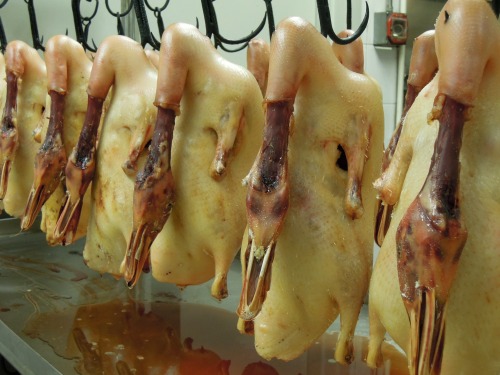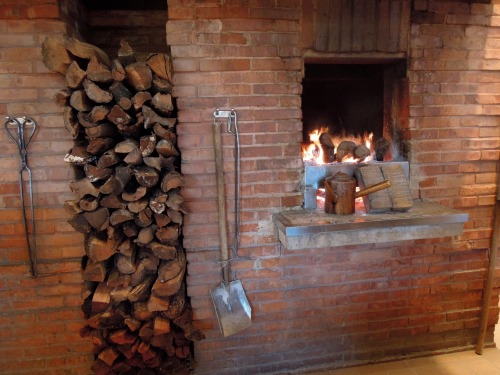
Let me introduce you to ducky: a 40-day old, web-footed gal that was hanging around a farm in Shun-Yi, Beijing just hours before I made her acquaintance in the kitchen of Made in China, a Chinese restaurant in Beijing’s Grand Hyatt hotel.
She was plump and pale-skinned, having been slaughtered and plucked before arriving on the premise not long after dawn. She and around 80 others would to be gutted and cleaned on-site that day: the first step in a 48-hour process that would result in meat so succulent and skin so exquisitely crisp that the dish was an imperial classic before its secrets filtered down to the masses and it became a dish of national acclaim.
You see, ducky and her squad had a special destiny: they were amongst thousands specifically selected by the city’s restaurants that day to be transformed into the quintessential dish Peking duck – or Beijing duck as it’s commonly referred to today.
Imperial origins
This culinary crowd-pleaser dates back to 1864 when a country man named Yang Quanren set up duck roasting digs in Peking, the Chinese capital (now Beijing). The cooks he employed were privy to the duck roasting secrets of the imperial kitchens – and the rest is history.
Today’s chefs take this ancient roasting ritual seriously. Preparation begins long before bird hits oven. Ducks are branded at birth as Beijing duck debutantes. They’re reared especially for the cause. They’re raised on farms surrounding the city, so they don’t travel far from paddock to plate.
These “beautiful ducks, with snow-white feathers” – as described by Yan-Kit So in the bible of Chinese cooking Classic Food of China – may have free-range privileges, but they are force fed at regular intervals to fatten them up. The procedure results in a plump breast and rich layer of fat beneath the skin that melts into the flesh – keeping it moist – during the roasting process.
Each duck weighs between 3 kilograms and 3.5 kilograms at the tender age of 40 days. This is when they are perfect for roasting. They’re young enough to have tender flesh and fat enough to ensure maximum succulence post-roasting.
Specialist restaurants have chefs who are devoted to the trade of roasting duck. It is their party trick. And it takes years to perfect. Chef ‘Terry’, who spoke to me via a translator as he walked me through the process step by step, has 15 years’ of duck roasting on his resume. It’s a well-honed skill that guarantees him a job for life in the gastronomic city.
Ducky’s revenge
He worked quickly: cutting off the feet (they’ll go in soup), pulling out the tongue (a delicacy), then slitting under a front leg and dragging out entrails (they have a culinary purpose, too) until the frame sagged like an empty sack on the draining board.
Chef Terry kept his workspace impeccably clean. He constantly splashed away blood and bits with cold water. But nothing could prevent the acrid smell of innards smacking me, deservedly so, in the face. Well-played, dear ducky!
Once cleaned, she was primed for roasting. First, finger-length pieces of bamboo were wedged inside her deflated body to help retain its shape during the roasting process. A tube – attached to an electronic pump – was carefully inserted between skin and flesh. The pump was switched on, air blown in, and ducky swelled like a balloon. This would help her paper-thin skin to become parchment dry and crisp. It’s a prized component of the final dish.
Hook-a-duck
Next ducky was hooked onto a rung above a stainless steel workbench. First she was doused with boiling water to open up the pores of the skin. Then she was basted with a cold sugared water solution that seeped into the open pores. The sugar caramelises during roasting and contributes to the prized, sweet, russet-red skin. Chef Terry turns his nose up at those who use honey instead, saying the results are too difficult to control and the sugar solution creates a better, more consistent, flavour.
The birds are hung to dry, limp necked, for six hours. Then they are lined up on hooks in the freezer for another 12 hours so the flesh doesn’t spoil as the sugar solution takes to the meat. I’m told the freezing process also changes the flavour of the meat, but the explanation of how this happens is lost in translation.
After the stint in the freezer, a bamboo plug is inserted up ducky’s bum and date-infused water is poured into her body cavity, so the flesh steams from the inside and roasts externally. The birds hang for another four hours to defrost, positioned in front of large fans that help them dry quickly. It is only then – inflated, sugared, frozen, defrosted, and dried – that they are ready for roasting.
A well-cooked duck
The Chinese restaurant equivalent of a pizza oven, made from fire-resistant brick, is ducky’s funeral pyre. She will be one of a dozen hung vertically over a date-wood fire and roasted at 250-degrees for 75 minutes. The fruitwood fire – as with the date infused water poured inside each duck pre-roasting – adds flavour to the succulent, white flesh.
Chef Terry tells me that the traditional method is to roast ducks for about 45-minutes. At Made in China they’re roasted for longer so more fat drips away – it’s supposedly a slightly healthier version.
At the table, the carved meat and shards of skin are popped inside delicate pancakes alongside matchstick sized pieces of spring onion and cucumber, and condiments such as sweet bean sauce or hoisin sauce. The steamed pancakes are rolled and eaten.
For maximum crunch factor, Beijing duck should be roasted to order and eaten within minutes.
Disclaimer
I didn’t get to eat ducky. She wouldn’t be roasted until the next day. And by the time that day’s ducks were suitably roasted and retrieved from the raging hot oven I was wandering around Tiananmen Square, eating Ritz crackers. But that’s another story.



Great behind-the-scenes post! So comprehensive. And yeah, I really enjoyed duck in Beijing.
LikeLike
It’s certainly a to-die-for dish! Thanks for your kind words.
LikeLike
Dear Rachel,
Thanks for a wonderful insight into the process of preparing Peking duck and to think you did not even have a piece! My most revered experience of this dish was actually in Singapore at the Super Duck restaurant at the top of Paragon shopping centre. The duck was masterfully prepared and cut by a master chef from Beijing. It was truly magical and also sadly made me realise that no Peking duck in Sydney could rival this particular one.
LikeLike
Thanks for that. Sometimes it think you have to eat a dish at the source … or as close to the source as possible to get the real deal. The next time i am in Singapore i will look up Super Duck. It’s always good to have restaurant recommendations.
LikeLike
The best Peking Duck I’ve eaten so far – and I’m by no means finished eating Peking Duck – was in Hong Kong at the Ritz-Carlton. It was amazing, but huge – we had all three courses and I thought I would explode.
Rachel, I am so sad that you didn’t get to eat the dish there in Beijing. I’m picturing you sad, dejected and hungry, nibbling on Ritz crackers – can’t wait to hear the rest of the story.
LikeLike
I had a wonderful Chinese banquet at the Ritz Carlton when i was there earlier this month … but once again the Beijing duck wasn’t on the menu!!
LikeLike
What a great “behind-the-scenes” you’ve given us. If you ever get the chance, I highly recommend having authentic Peking Duck from the QuanJuDe restaurant in Beijing. It’s so cool thinking that those ducks were ESPECIALLY branded for eating..
on second thought: poor ducks..
LikeLike
Thanks for the recommendation, Lucy. Chef Terry at the Grand Hyatt in Beijing also recommended QuanJuDe … i just didn’t get the chance to go there. Only in Beijing for a day! Next time …
LikeLike
Another wonderfully informative piece of writing, Rachel. Makes me yearn for overseas travel. I have not yet been to Asia, but it is definitely on my to do list. Glad to hear that the process was so clean!
LikeLike
Thanks Lizzie. You must get to Asia. You will not look back!
LikeLike
Oh I love Peking duck! I’ve never heard it referred to as Beijing duck, but I suppose that’s because I now live in a country where they refer to the city as “Peking”.
I have a friend here who keeps suggesting that we should try to make Peking duck at home but, unfortunately, it’s not as simple as buying any ordinary duck from the butcher; all of our research has pointed to a special breed of duck in the UK which has been identified as *the* one for Peking duck. But this would require one of us to smuggle into Switzerland a fresh duck from the UK … we haven’t worked out yet how we would explain that to customs!
Shame that you didn’t get to try some Peking duck while you were in China …
LikeLike
Yan-Kit So in Classic Food of China talks about “beautiful ducks with snow white feathers” when she discusses Peking duck … but she doesn’t mention the breed. What breed is the “one”? She provides a remarkably simple recipe too … If you manage to find your duck, let me know, and i’ll send you the recipe (if you don’t already have half a dozen ready to go!!)
LikeLike
Apparently, the Gressingham duck is the favoured duck in all Chinese restaurants in the UK, something about the high fat content. So we thought that if we were going to go to the effort to make Peking duck, we should at least start with the right duck 🙂 I am always open to recipes and would love yours when you get a chance 🙂 Thank you!!!
LikeLike
Well written and wonderfully informative post. I wonder whether Charlie Trotter is going to have Beijing Duck banned (aka Fous GRAS)?
LikeLike
Fous GRAS = Fois Gras Damn you auto spell!
LikeLike
It gets us every time!
LikeLike
Excellent point … it’s amazing how you we can turn a blind eye to certain things!
Thanks for tuning in …
LikeLike